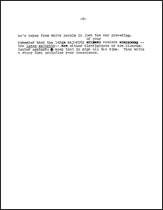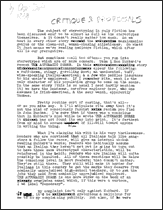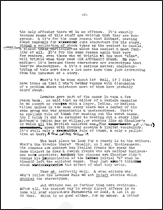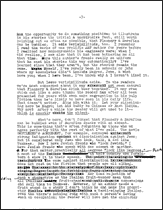The subject of stereotyping in pulp fiction has been discussed enuf to be almost as dull as the stereotypes themselves. & it doesn't really matter too much. So we meet in every other story the megalomaniac genius or the clean-cut, woman-chasing slipsticker. So what? It just means we're reading mediocre fiction, which after all is our prerogative.
But sometimes --all too often-- you run into stereotypes which are of more concern. Take L Ron Hubbard's recent THE AUTOMAGIC HORSE. In this story appear the following: a ruff-hewn, stingy, r-rolling Scot; an uneducated, tuff, wise-speaking Italian-American; & a Jew who peddles insurance to his uncle's employees. If I remember rite, each is the only character of his population group to come on the scene. In the same story (this is so usual I need hardly mention it) we have the handsome, carefree engineer hero, who one assumes is Irish-American, & the sexy wench, apparently Yankee.
Pretty routine sort of casting, that's all-- or so you mite say. & I'll stipulate rite away that it's not the kind of consciously fascist racism you find in John Buchan. I'm sure that if there was a conscious thot in Hubbard's mind while he wrote THE AUTOMAGIC HORSE it has not found its way into print. It's farthest from my mind to accuse him of ill-will toward anyone in writing the thing.
What I'm charging him with is his very thotlessness. Readers who are convinced that all Italians talk like gangsters & follow the races, will give an internal uh-huh reading Hubbard's words; readers who habitually assume that an Italian they haven't met yet is going to turn out to have those same stereotyped characteristics, will be reinforced in the habit; readers who are Italian will quite possibly be insulted. All of these reactions will be below the conscious level in most readers; that doesn't matter. They're still there. They still will make it harder for Italians in this country to get the marks they deserve from nominally unprejudiced high-school teachers, or to get the jobs they need from nominally unprejudiced employers. THE AUTOMATIC HORSE is one more straw on the back of an overladen camel which, if this were a cartoon, I wd label "Democracy".
My complaint isn't only against Hubbard. If it was, it'd be gratuitous & malicious for me to do my complaining publicly. But also, if he were the only offender there wd be no offense. It's exactly because reams of this stuff are written that they are dangerous. & it's for the same reason that Hubbard, casting about randomly for cute characters for his story, picked a collection of stock types as the easiest to handle, & picked these particular ones as about the easiest & most familiar of all. It's for the same reason again that very few readers, even those who wd bristle at the word "kike", will bristle when they read THE AUTOMAGIC HORSE. To summarize-- it's because these characters are stereotypes that they're stereotypes. & it's a serious matter; character-typing of this sort does a lot more harm than just detracting from the interest of a story.
What's to be done about it? Well, if I didn't have ideas on that I wdn't bother vapans with discussion of a problem whose existence most of them have probably heard about.
Lowndes gave part of the anser in vapa a few years back. He said that as editor of a Western magazine he wd accept no story with a Negro, Indian, or Mexican villan unless in the same story there was a member of the same group who was sympathetic & unstereotyped. That's an exellent rule of thumb for weeding out the worst cases, tho I think it shd be extended to weeding out a story like Hubbard's (which has no villan) ,or stories like AB Chandler's in which all the British enlisted men (tho not villans) speak with Cockney accents & limited vocabulary. It's still only a rule of thumb, & only a palliative at best; & few editors follow it.
The best place to look for a remedy is to the writers. What's the trouble there? Usually, as I say, thotlessness. The chances are Hubbard has Italian frends who speak the same dialect he does & Jewish frends who are neither businessmen nor nepotists; the chances are Chandler didn't change his pronunciation of the initial "h" when he himself left the enlisted ranks. They just siden't think about the effect of what they write.
They cd, perfectly well. & even editors who wdn't follow the Lowndes Rule wd not reject stories which avoided the stereotypes.
But writers can go farther than mere avoidance. After all, the easiest way to avoid direct offense is to name all your characters Farnsworth or Dodd, & let it go at that. Which is no good either, for my money. A writer has the opportunity to do something positive: to illustrate in his stories the trivial & unobtrusive fact, still worth pointing out as often as possible, that Flannery & Sarafian can be buddies. It adds verisimilitude, too. I remember I read the works of one prolific ASF author for years before I realized how monochromatic his engineers were; when I did realize, I saw also that it had been bothering me all that time. Were this author's frends really so uniform that he cast his stories this way automatically? I've learned since that they aren't, but the stories remain the same. Myself, I've rarely been in schools or jobs where my associates didn't include Negros, Jews, & what have you; when I have been, I've known why & I haven't liked it.
But leave verisimilitude aside. To the readers we're most concerned about it may not seem natural that Flannery & Sarafian drink beer together. It may even stick out like a sore thumb: the reader has after all been presented for years with even more segregation in his pulp fiction than he's likely to have seen in his daily life. That doesn't matter. Slug him with it. Let your slipstick-ing hero be Negro; let his buddy be Chinese or East Indian. Why not? After a while the reader will get used to it-- which is exactly the object.
What's more, don't forget that Flannery & Sarafian can be buddies even if Sarafian speaks with an accent. This is something that's often forgotten by those who wd agree perfectly with the rest of what I've said. The movie GENTLEMEN'S AGREEMENT, for example, conveyed strong indignation at discrimination against Jews; but it considered only Jews who look, talk, & act like Yankees. Now I have Jewish frends who "look Jewish;" I have Jewish frends who speak with one accent or another. For that matter, practically all Negroes "look like Negroes," & most of the Puerto Ricans in this country are forein-born & show it in their speech. The case against discrimination does not rest on the fiction that people are all alike. Nor does rejection of such a stereotype as the Italian fruit-vendor mean that all Italians holding fruit-stand concessions shd sell them to Yankees. However, if an author needs a fruit stand in a story I don't think he shd make its proprietor a Verdi-singing Italian, even tho there's nothing rong with such a person's having such an occupation; the reader will have met the character previously in a disproportionately large number of stories.
In short: Complete stereotypes are very harmful even when handled, as sympathetically as in HL Gold's TROUBLE WITH WATER, but it may be desirable sometimes to give a non-Yankee character some traits (such as a forein accent) which have been unfairly represented as objectionable by the stereotypers.
You may have been bothered a few paragrafs back by a suspicion that my suggestions were departing from the realm of the immediately feasible. I'll settle that rite now. They are. A Negro hero wd not be tolerated by many editors, & I suppose practically all editors wd prefer that you make him white. I don't know any market exept for leftist magazines or arty ones where a Negro hero wd be allowed to get the girl if she was white. There's an instance from my own writing experience: a (sympathetic) character in one of my stories was a Negro fysicist. In manuscript; in the story as published it was not mentioned that he was Negro. In breaking this resistance down, readers as well as writers shd help. Letters criticizing chauvinist stories wd go a long way tord persuading editors to accept positive ones. (I shd add that already ASF has had many stories with sympathetic, unstereotyped characters who were East Indians, Italians, Jews, or even Negroes. No major reform is necessary for this precedent to be followed.)
I haven't said anything yet about the specifically science-fictional aspects of the question. In s-f you're not writing about the world of 1949, which,as far as inter-group harmony goes, stinks. You're writing often about the distant future, when we hope the present divisions & oppressions will be eliminated. This makes a difference. Example: In a story about the near future you shd include Negro scientists, even tho tragically there are few of them in fact; in your 24th-century America there shd be Polynesian & Eskimo scientists as well, because you can be darn sure they'll be around when the 24th century arrives. 2nd example: Character who you mite name Iso Yukawa or Selma Hirschman in the 20th century, mite in a time more remote be named Vassily Yukawa or Christiana Hirschman; you want to assume that all population groups will participate in future civilization, but you also want to recognize that they won't remain as separate as they have been. (The once-oppressed Welsh are still a distinct group, yet no Englishman wd forbid his dauter to marry an otherwise qualified Welshman.) 3rd example: In the 24th century, Parker Hollister will be as likely to speak with a non-American accent as Karel Kowalewski, or almost as likely.

There's one type of stereotyping which I haven't discussed in spite of the fact that it raises problems similar to those of nationality stereotyping. I mean the Kinder-Küche-Kirche line, which, is followed appallingly often in American popular literature & has occasionally appeared quite blatantly in s-f . The reason I haven't discussed it is that here s-f (or at least ASF) is way ahead of most pulps, & still improving. Women in s-f are frequently educated (even the stock hero-marrying dauters of professors); they're also frequently dominant characters, important to the story as more than love-objects. It is unfortunate that, as illustrated recently in ASF, doctors of the future all are male & are assisted by female nurses. But on the whole s-f authors invent women who are people almost half as often as they invent men who are people , which is more than you can say for mystery writers.
I hope the recommendations I've made will be taken seriously-- especially by those of you who are editors &/or writers. To go along with the tradition that Negroes, Jews, and Italians can be admitted into fiction only in minor roles as stereo-typed comic-relief is to reinforce in readers' minds the prejudice, which I assume is abominable to all of us, that Negroes, Jews, and Italians can't be admitted to equal positions in American life. It's not enuf to refrain from expressing bias; it's necessary to counteract the bias present in practically every page now read by Americans. The criterion of your success in the next story you write will not be your adherence to my suggestions; they're only my suggestions, & I'd like to have discussion of their correctness. The criterion will be the reactions of your readers . Write a story that will give a few bigots the jolt they need. Write a story that will open the eyes of the unconsciously bigoted. Write a story that will compensate, for some Negro reader, for the insults he's taken from white people in just the day preceding.
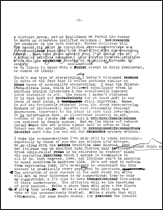
Remember that the large majority of your readers --the large majority-- either discriminate or are discriminated against; keep that in mind all the time. Then write a story that satisfies your conscience.
